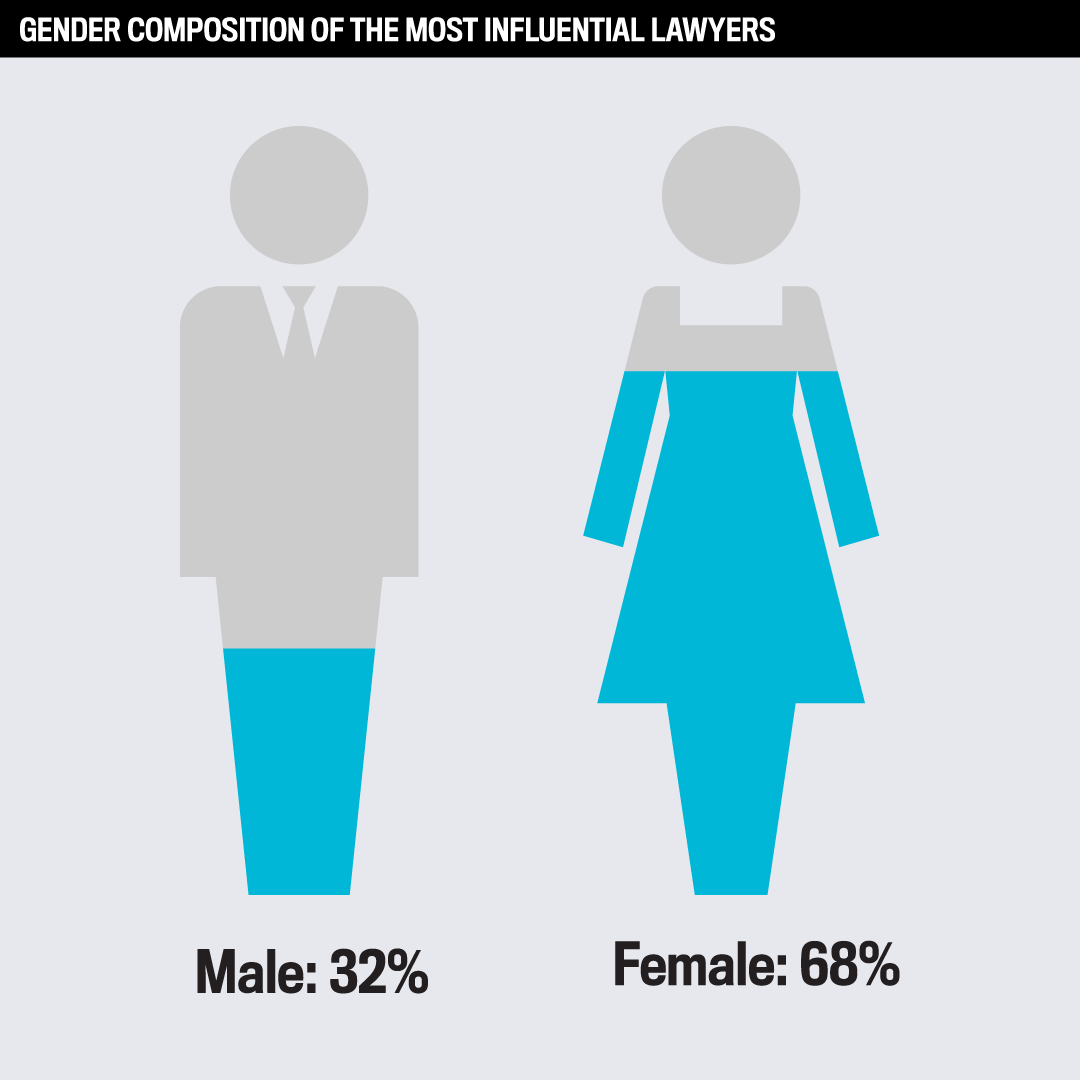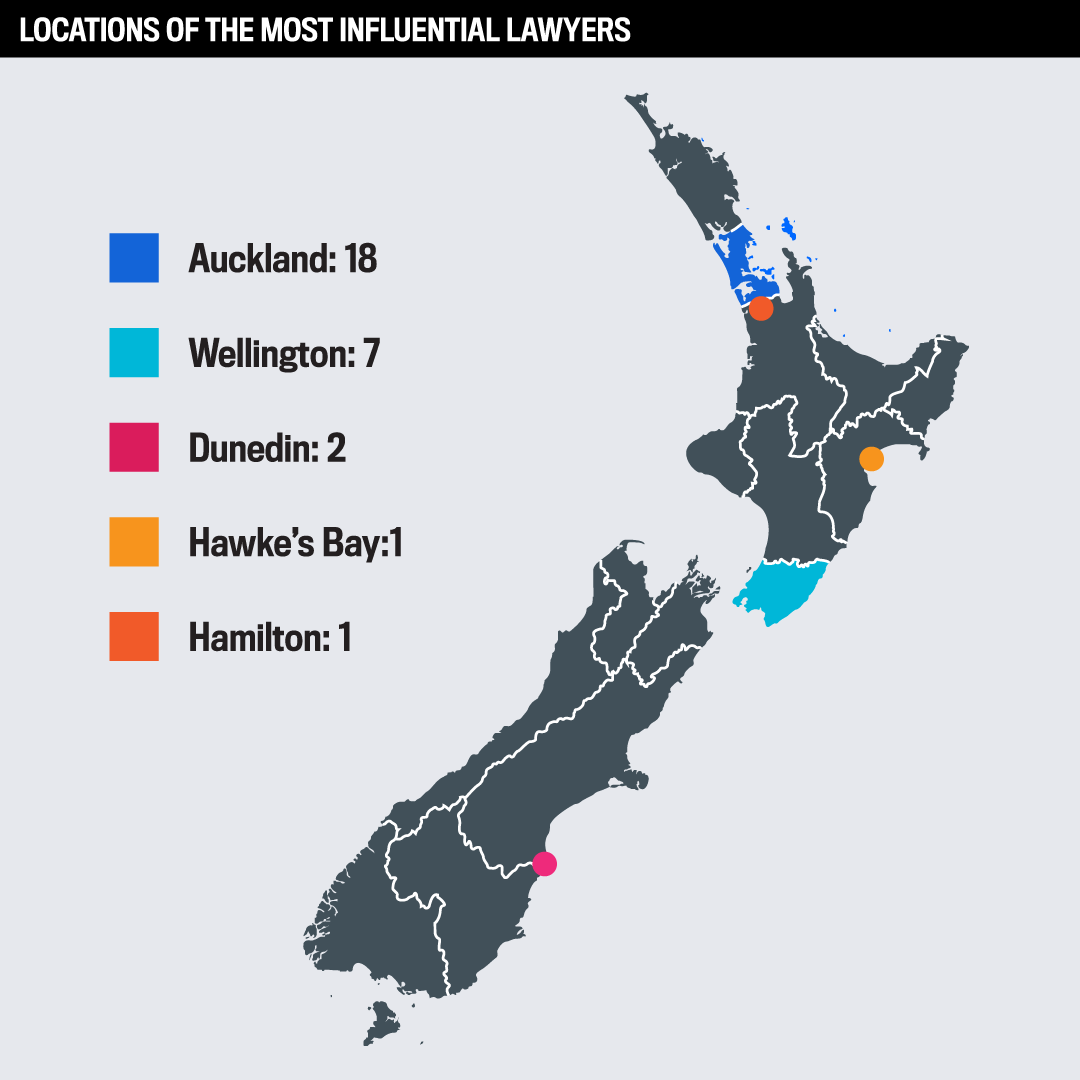

Jump to winners | Jump to methodology
The world has never been changing more rapidly than it is today, and over the last several years, the legal profession has seen a rise in demand for its services like never before.
As the world gradually recovers from the COVID-19 pandemic, lawyers are grappling with issues around employment, technology, climate emergencies, and social justice. Old legislation is also being re-examined, and past injustices are being brought to light and scrutinised under a modern legal lens. In 2022, there is no shortage of demand for influential lawyers – and this year’s winners have all had a notable impact on laws, the justice system, and the legal profession as a whole.
Now in its second year, the list of the Most Influential Lawyers in New Zealand determines standout legal professionals across four key categories. The 2022 winners include high-profile industry veterans and young up-and-comers bringing new ideas, energy and innovation to the legal field. There are specialists across all areas of law, as well as lawyers who have championed initiatives around fairness, diversity, and inclusion while carrying out their professional duties.
“We have developed the law by helping clients offer financial services and products in new and innovative ways. These are complex legal areas where the law is playing catch-up to exponential technological growth”
Jeremy Muir, MinterEllisonRuddWatts

The Most Influential Lawyers practice across a broad range of areas, each characterised by certain issues and legal intricacies.
The technology sector in particular has boomed over the last several years, and emerging technology is offering new challenges to lawyers every day. According to Jeremy Muir, partner at MinterEllisonRuddWatts and a winner in the Business category, the legal sector has some way to go before it gets a firm grasp of the laws surrounding the current tech boom. However, it has also become an opportunity for lawyers to make their mark on a massively influential area of business.
“We’ve acted for one of New Zealand’s most successful start-ups, many of New Zealand’s venture capital funds, and we’re breaking new ground in the development of New Zealand’s cryptocurrency, digital assets and blockchain industry,” Muir says.
“We have developed the law by helping clients offer financial services and products in new and innovative ways. These are complex legal areas where the law is playing catch-up to exponential technological growth.”
Given New Zealand’s prolonged border closure, lawyers have also been met with increased demand for advice on immigration, employment and business operations. Duncan Cotterill partner Jonathan Scragg notes that clients have had to navigate “extremely challenging conditions” over the past several years, and this has translated into some targeted growth for his law firm.
“Given the current immigration settings, it has never been more important for businesses to address migrants on temporary visas, and the families that have been affected by border closures,” says Scragg, who is recognised in the Changemakers category.
“This led the firm’s decision to grow our capabilities in this area. Our growth mirrors the increasing client demand for advice on how to face the effects of COVID-19, as well as the ever-increasing regulation of workplaces, business operations, property, trusts and migration.”
Several of this year’s winners have also handled complex issues concerning the Treaty of Waitangi, dealing with questions around Treaty breaches in the granting of land to iwi. One of them is Frazer Barton, an Anderson Lloyd litigation partner and an awardee in the Changemakers category. He acted on a precedent-setting case involving the Raukawa Settlement Trust, advising on a High Court judgement concerning a granting of land.
“The case involved complex issues concerning the Treaty of Waitangi and tikanga,” Barton says.
“Ultimately, the Court held that the Waitangi had been in breach of tikanga, and this case has just been argued on appeal in the Supreme Court.”
“Increasing our cultural competency has also been a focus area for the firm overall,” Barton adds.
“We’ve established a cultural intelligence program to enhance the firm-wide understanding of te ao Māori, in conjunction with Ngāi Tahu.”
“Using systems and tools both from te ao Māori and the Western legal system, she can help Māori find comfort within the legal frameworks of Aotearoa”
Nominator for Renika Siciliano, McCaw Lewis Lawyers
Increasing cultural competency has been a prevalent theme throughout this year’s submissions, with many of the winners championing initiatives to increase understanding of te ao Māori and incorporate Māori values into their firm’s decision making.
Diversity and representation have also been a strong focus point across the board, with winners highlighting the importance of maintaining a strong gender balance at all levels of leadership, as well as enhancing cultural and ethnic diversity within their organisations.
The importance of the latter, particularly within the legal profession, is highlighted by the nominator of Young Influencer and McCaw Lewis Lawyers executive director Renika Siciliano, who has done a significant amount of work with hapū and iwi on employment law matters.
“Using systems and tools both from te ao Māori and the Western legal system, she can help Māori find comfort within the legal frameworks of Aotearoa,” Siciliano’s nominator says.
“In her client approach, Renika commits to understanding and being able to represent their values, and she incorporates those values into her advice and advocacy.”
“Underpinning this balance is her ability to apply tikanga in a way that enhances the mana and outcome for whoever she deals with,” the nominator adds. “This includes a values-based approach to her mahi, regardless of the client or area of law. This has become significant in all her work – particularly with hapū and iwi – but has been highlighted recently through her employment law mahi.”
When it comes to ethnic diversity within the legal profession, Chen Palmer co-founder and senior partner Mai Chen says that the progress has “only just started”. The chair of the Superdiversity Institute of Law, Policy and Business and president of New Zealand Asian Lawyers believes that having access to a law professional who understands one’s cultural background is vital for many clients.
“Half of the population of Auckland is Asian, Māori or Pasifika, and so you need staff that understand the culture and language of those different ethnic client bases,” Chen says.
“This is not about special treatment – it is about equal access to justice, and an understanding of the unique issues for different culturally and linguistically diverse people that makes that more challenging.”
“As Amartya Sen says, diversity is about identity,” she explains.
“We all have a gender, an ethnicity and a sexual orientation, different religious faiths and disabilities – we are not homogenous, whether that be clients, lawyers or judges. The latest Chief Justice Annual Report showed 15% of judges have two parents who did not finish high school, 31 of the judges participating in the Judicial Diversity Survey have two parents who immigrated to New Zealand, 44 have one parent who immigrated to New Zealand, and 26 immigrated to New Zealand themselves.
“Diversity in our profession and in the judiciary matters.”
“We all have a gender, an ethnicity and a sexual orientation, different religious faiths and disabilities – we are not homogenous, whether that be clients, lawyers or judges”
Mai Chen, Chen Palmer

If this year’s submissions for the Most Influential Lawyers list have proven anything, it is that change within the legal profession never slows down. Thus, the need for innovation is constant.
From tackling precedent-setting and previously uncharted issues, to championing growth in areas of high demand, to driving equality and fair representation, the winners have all demonstrated their excellence and are taking New Zealand’s legal sector to new heights.
In March 2022, NZ Lawyer’s research team issued a call for nominations for the country’s Most Influential Lawyers across four categories: Changemakers (lawyers who have been leaders, innovators or catalysts for positive change in any area of the profession); Business; Human rights; advocacy and criminal law; and Young influencers (lawyers aged 40 or under).
All nominees were asked to provide examples of their accomplishments and contributions to the legal profession. The research team reviewed the nominations, evaluating them based on the overall impact of each nominee’s contributions. The 29 lawyers who made the final list were those who delivered specific outcomes in support of their peers and the industry.